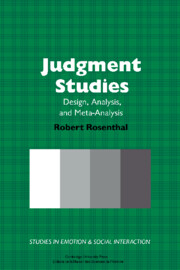Book contents
- Frontmatter
- Contents
- Preface
- PART I THE DESIGN OF JUDGMENT STUDIES
- 1 The nature of judgment studies
- 2 Sampling judges and encoders
- 3 Stimulus selection and presentation
- 4 Judges' responses
- PART II THE ANALYSIS OF JUDGMENT STUDIES
- PART III THE META-ANALYSIS OF JUDGMENT STUDIES
- Appendix Statistical tables
- References
- Name index
- Subject index
1 - The nature of judgment studies
Published online by Cambridge University Press: 06 November 2009
- Frontmatter
- Contents
- Preface
- PART I THE DESIGN OF JUDGMENT STUDIES
- 1 The nature of judgment studies
- 2 Sampling judges and encoders
- 3 Stimulus selection and presentation
- 4 Judges' responses
- PART II THE ANALYSIS OF JUDGMENT STUDIES
- PART III THE META-ANALYSIS OF JUDGMENT STUDIES
- Appendix Statistical tables
- References
- Name index
- Subject index
Summary
Some dimensions of judgment studies
Research in nonverbal communication very often requires the use of observers, coders, raters, decoders, or judges. Although distinctions among these classes of human (or at least animate) responders are possible, we shall not distinguish among them here but rather use these terms more or less interchangeably.
Judgment studies may focus on nonverbal behaviors considered as independent variables; for example, when the corners of the mouth rise, do judges rate subjects as being happier? Judgment studies may also focus on nonverbal behaviors considered as dependent variables; for example, when subjects are made happier, are the corners of the subjects' mouths judged as having risen more?
Judgment studies may employ a variety of metrics, from physical units of measurement to psychological units of measurement. For example, the movement of the corner of the mouth can be given in millimeters and judges' ratings of happiness may be given on a scale, perhaps of seven points, ranging from “not at all happy” to “very happy.”
The judgments employed in a judgment study may vary dramatically in their reliability. Thus, judgments based on physical units of measurement are often more reliable than are judgments based on psychological units of measurement, although, for some purposes, the latter may be higher in validity despite their being lower in reliability (Rosenthal, 1966).
- Type
- Chapter
- Information
- Judgment StudiesDesign, Analysis, and Meta-Analysis, pp. 3 - 8Publisher: Cambridge University PressPrint publication year: 1987



